5 Mar 2026
After Matter: A Gathering for Circular Un/making
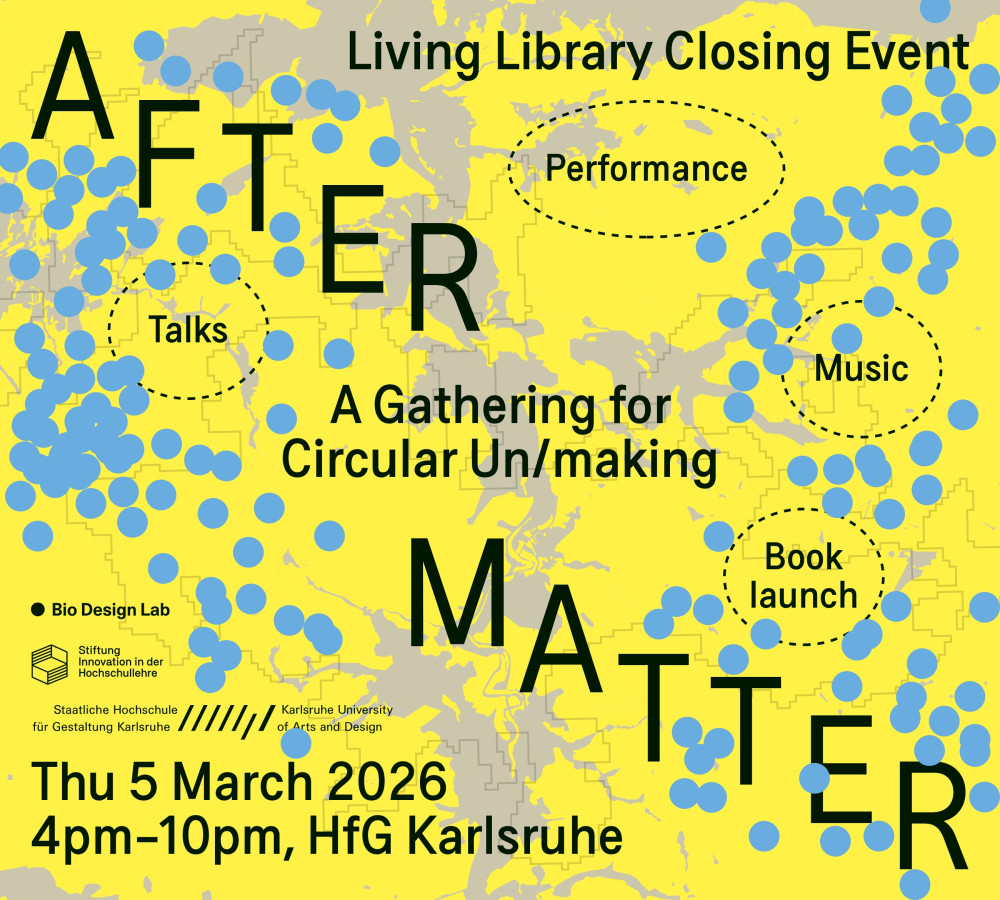
How can collected knowledge and materials be transformed into circular practices? At the end of the project period, the Living Library invites everyone to an evening of intertwined conversations, artistic inputs, and performative gestures. From impulse talks on afterlife and urban gardening to sound performances, a bioregional dinner picnic, and a compost ritual: join us and toast the end and the new beginning! We will conclude by celebrating the official launch of the publication—accompanied by drinks and DJs.
RSVP: https://cloud.hfg-karlsruhe.de/apps/forms/s/9R6cQ8GbjJPsfjaXsHZjRYfQ
1 Feb 2026
Tag der offenen Tür: Maps and Knots
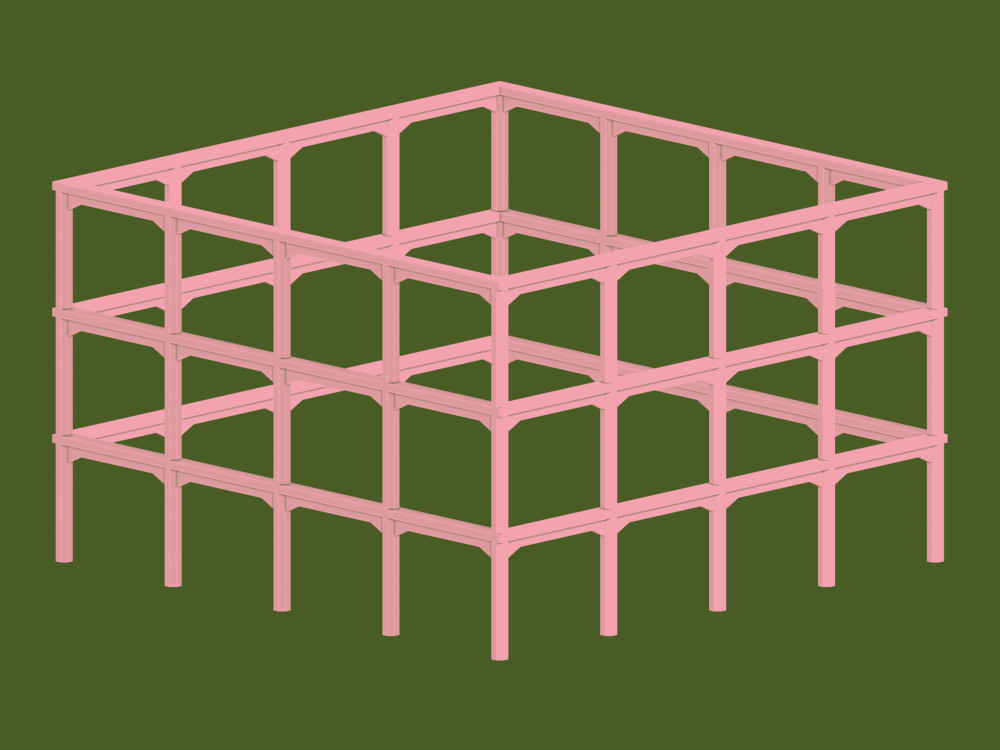
© Lu Kellert
How does map creation actually work? What information is included, and what is left out? And what does this have to do with bioregioning and knotology?
Find out at our “Maps and Knots” workshop: Here we will show you in a playful and experimental way how to create your own individual maps of your surroundings. We will also teach you knotting and knot techniques—and, along the way, share some information about the Living Library project. Come and join us!
Time: 12:00 – 15:00
Location: Living Library, HfG Ground Floor
21 Nov 2025
Mini Composter and Soil Quality Workshop
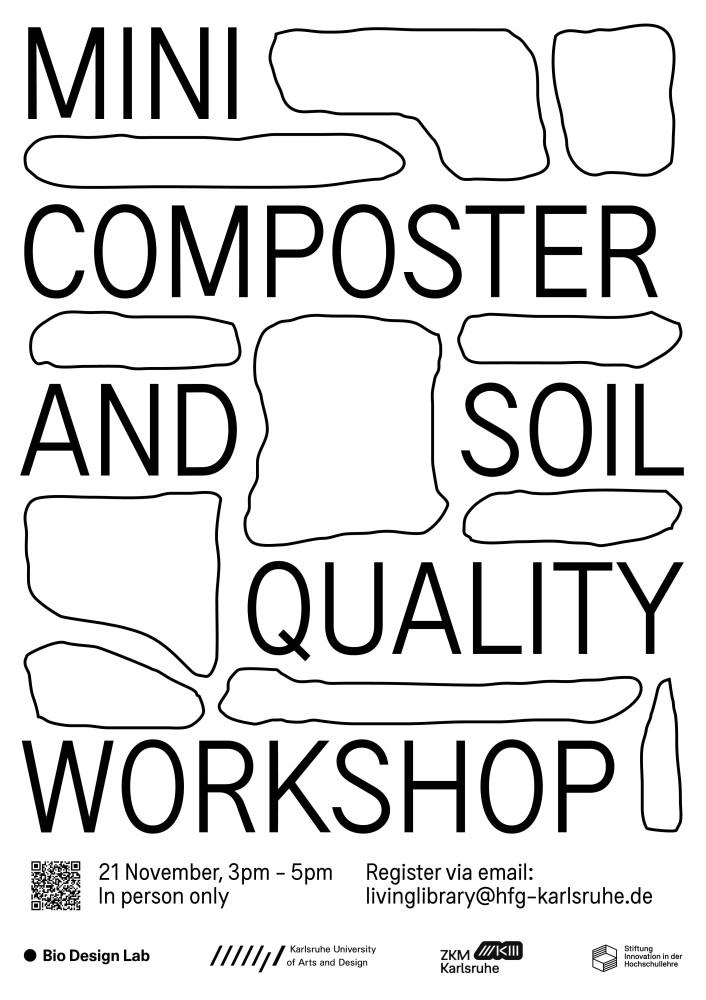
As part of the research developed for the Living Library project, the first section will be dedicated to building a mini DIY composter, allowing participants to address composting from different perspectives, such as how to compost food and new organic materials.
Based on the Living Library's ongoing research on soil and the collection of different samples, some soil structures will be observed in connection with their regional areas and nutrient composition. As the ultimate goal, participants will learn how to reuse the soil compost as a sustainable plant fertiliser.
The workshop is open to a wide audience of adults, art and design students, researchers, or anyone simply curious. It is accessible via registration at livinglibrary@hfg-karlsruhe.de. The workshop will be held in English
At 6pm participants will be invited to the Blaue Salon Cinema at HfG, for the screening of Taste of the Land documentary by Adam Loften, Emmanuel Vaughan-Lee | USA 2024 | 70 min | DCP | Original version with English subtitles | with Kalyanee Mam
The two events complement each other and show how close our relationship to the soil is and what role it plays in the global ecosystem.
In connection with this workshop, on Saturday, 22nd November, the ZKM will organise a guided tour to the Assembling Grounds Exhibition, to which the Living Library is taking part.
2 Aug 2025
«La Carte Locale» Einmalige KAMUNA Pop-up-Weinbar
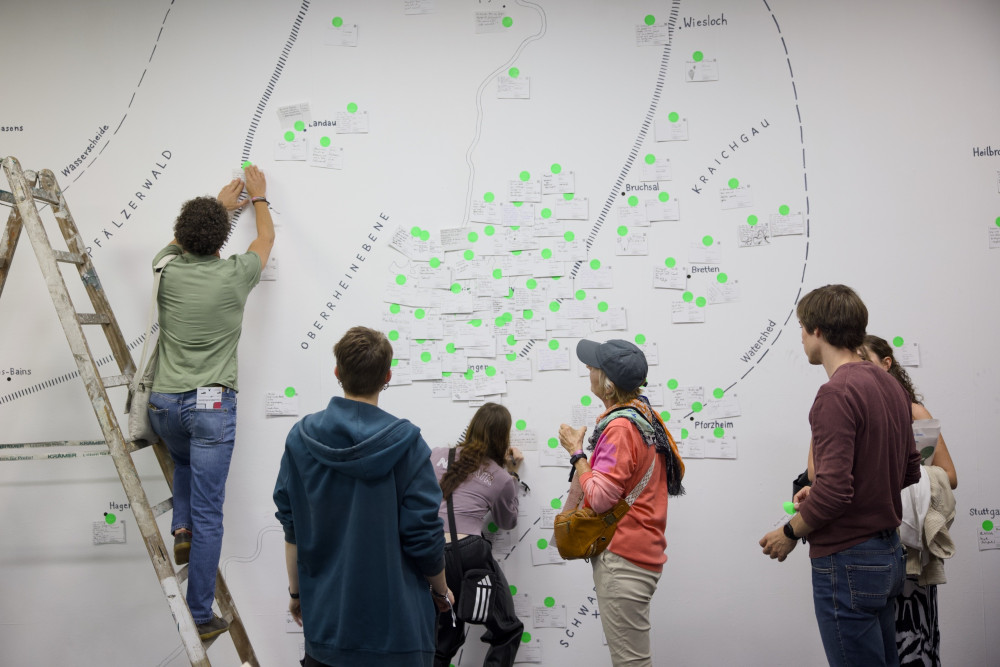
Opening «La Carte Locale», a one-night-only wine bar hosted by the Living Library. Join for a glass of wine and an evening of mapping memories, personal stories, and knowledge of the local region around Karlsruhe.
August 2nd from 6pm until 10pm during the annual Karlsruher Museumsnacht.
Lorenzstraße 15 (HfG Karlsruhe)
26 Jul 2025
Opening '404: Archive Not Found' at Assembling Grounds: Practices of Coexistence
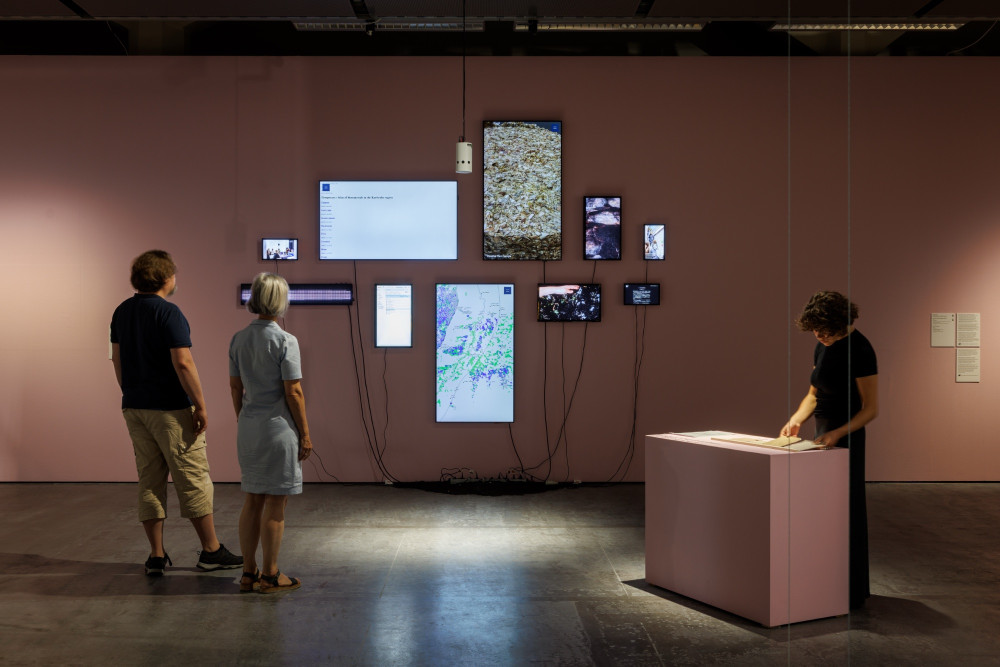
How can materials and knowledge be collected locally, used, and then returned to the cycle? To answer this question, the Bio Design Lab team is studying biological materials, crafts, and knowledge from the region within 50 kilometers of Karlsruhe.
The team is studying materials like wood from the Black Forest and food scraps from the city. They are also looking at old handicraft techniques, stories from the region, the region’s landscape, and its economy. The team aims to gather knowledge and experience over a period of two years. This experiential learning approach will be tested and improved through structured workshops and hands-on outdoor exercises.
404: Archive Not Found shows the project as an installation and also addresses its digital development. The project team’s approach is explained, and materials, digital objects, and the Living Library archive itself are displayed. The installation makes us ask: Can knowledge and materials be stored digitally? What happens to them when the people who care for them are no longer around? Do digital files decompose over time? Compost is a symbol for the project. It shows: everything changes.
Old things disappear, and new things emerge. The archive is always changing. The earth will become the final, permanent storage place.
On view July 26, 2025 – Feb 8, 2026
30 Jun 2025 & 1 Jul 2025
On tradition and transition - Hemp with Freia Achenbach and Hannah Segerkrantz
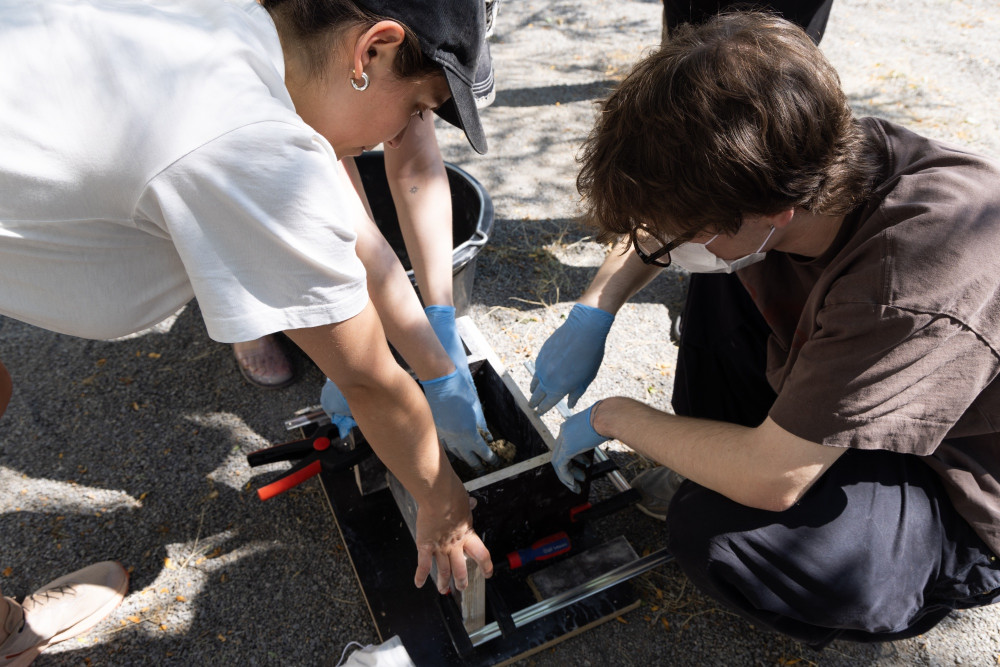
With designers Freia Achenbach and Hannah Segerkrantz, students explored hempcrete and rope-making. After field visits to a hemp processing site and a traditional ropemaker, the workshop highlighted hemp as a material of ecological resilience, combining building techniques with craft processes.
Freia Achenbach is an artist and designer creating objects and spaces that foster emotionally resonant and ecologically grounded relationships between people and their environment. Her practice is guided by a continuous process of researching, sensing, and experimenting with materials, crafts, and technologies - combining analytical thinking with intuitive making. This approach translates into outcomes across a variety of scales, ranging from material research, bespoke objects to public installations.
The notion of agency is always central in the work of Hannah Segerkrantz, and goes in parallel with the re-definition of what we address as our ‘surroundings’. With an interest for the intersection between architecture and radical ecologies, her approach to research is environmental, sensitive and contextual. Whether exploring the cultural background and gestures of architectural materials, or studying the relations between objects, people and local traditions, she offers tools and means for bridging our connection with the environments we inhabit.
2 Jun 2025 & 3 Jun 2025
On displacement and adaption - Invasive plants with Prof. Filipa César and Atelier Schaft

Media-artist Filipa César and the design studio Atelier Schaft introduced invasive species as controversial yet fertile material sources. During the field trip to the woods with a local forester, invasive plants were removed under expert supervision, while in the workshop - using composite binders and pigments - conventional notions of belonging, ownership, and value in ecology were challenged.
Prof. Filipa César is an artist, filmmaker, educator and community organizer. She is interested in the fluid borders between cinema and its reception, the politics and poetics of the moving image and archival practices. Since 2011, César has been collectively researching the militant cinema practice of the African Liberation Movement in Guinea Bissau, through the production of workshops, archives, films, performances, publications and community gatherings.
Atelier Schaft is a design studio based in Rotterdam, the Netherlands focusing on projects that combine design, nature, and handcrafted bio-materials. Known for its innovative use of invasive plants such as the Giant hogweed, the studio crafts unique objects, facilitates material workshops, and embraces collective creation.
13 May 2025
Talk & Tour
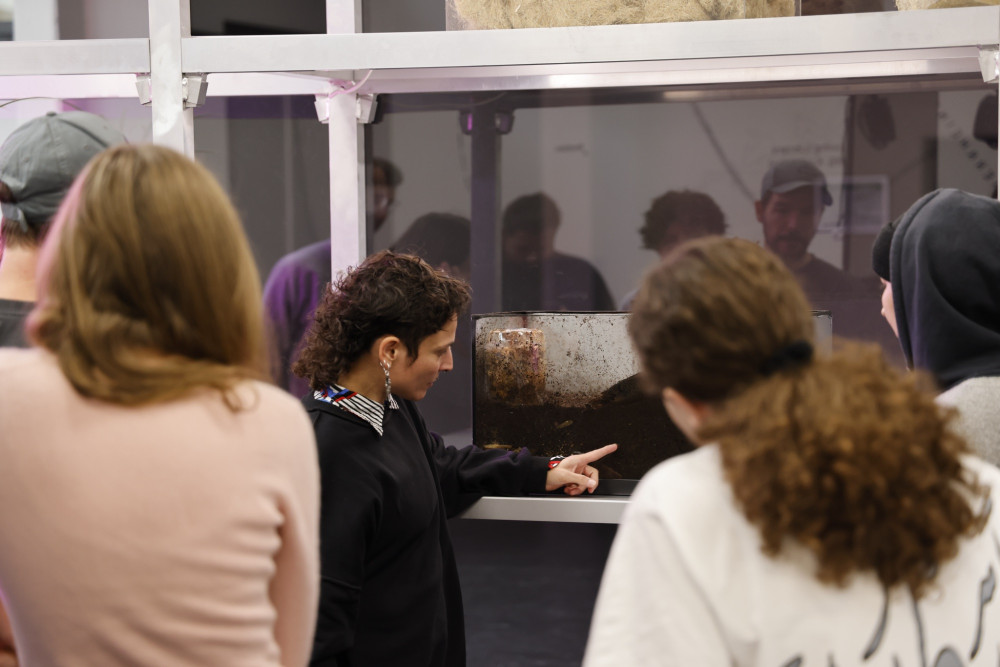
Tour & Talk is an open format for the all HfG members and the public during which the space of the Living Library and the associated material archive are presented. Visitors will be introduced to the material shelving system, which was also developed with the support of HfG students during the semester training programs. There will be a question and answer session at the end.
13th May at Living Library space, 11am - 12:30pm
6 May 2025
Maps Café
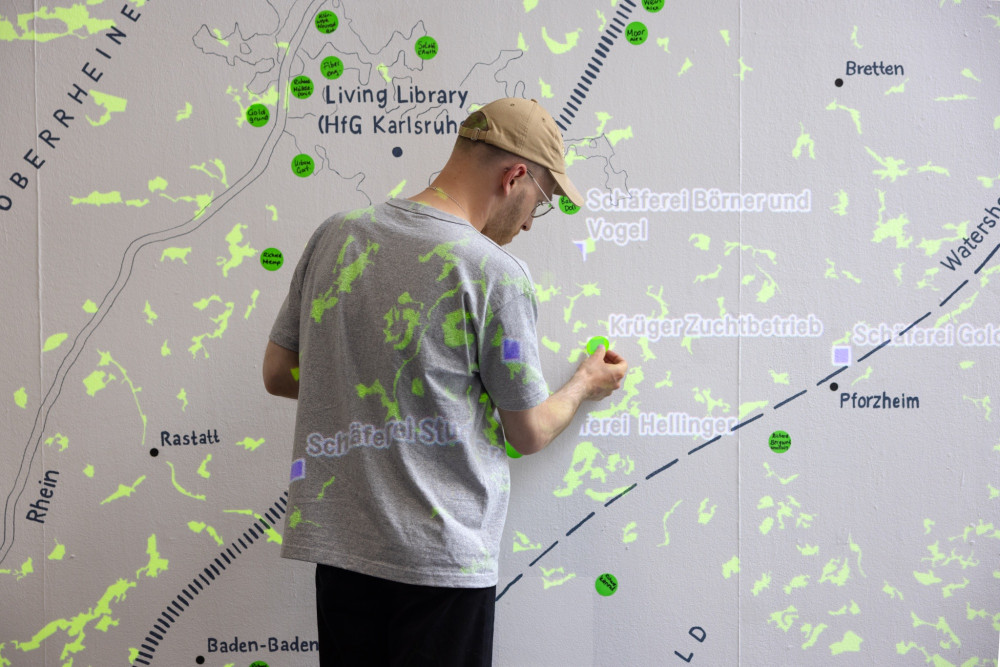
In this mini-workshop for HfG staff and students, we expand the large Living Library map to include your personal stories and local knowledge of Karlsruhe. Come join us for 5 minutes or sit down for a nice free eco-coffee, everything is welcome!
1pm - 2pm, Living Library (ground floor)
5 May 2025 & 6 May 2025
On extraction and resilience - Wood with Simon Gehring & Stefan Kudermann

A field trip led by product designer Simon Gehring and wood mediator Stefan Kudermann connected forest ecosystems, carpentry shops, and timber factories. The workshop on joinery emphasised wood as a responsive material, asking how construction can shift from extraction to dialogue.
Simon Gehring is an Industrial Designer, Researcher and Digital Artist, and Computational Designer. His work is characterised by the use of digital and generative tools and the exploration of innovative manufacturing processes and materials.
Stefan Kudermann is the Managing Director of Zentrum Holzbau Schwarzwald GmbH (ZHS). At the Black Forest company Holzbau Bruno Kaiser, he worked as a field sales representative, project developer, and marketing manager. He is also a member of the LEADER decision-making body and a member of the Freiburg Architecture Forum.
3 Feb 2025 & 4 Feb 2025
On remediation and interfacing - Mycelium with Nina Flaitz and Liene Kazaka
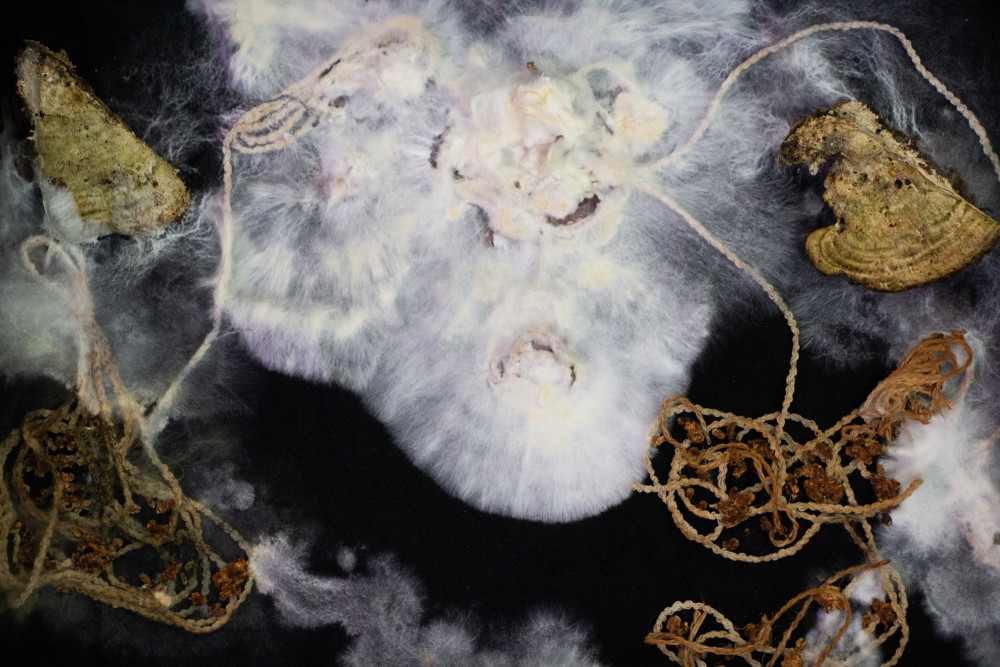
Designers Nina Flaitz and Liene Kazaka introduced mycelium as both a biological network and a design material. After a visit to the local fungi herbarium and a mushroom hike in the Rhine floodplains, students experimented with mycelium growth and its textural properties in the lab.
Nina Flaitz is a graphic designer and material researcher based between Stuttgart and Lausanne. She earned her diploma in Visual Communication from the Stuttgart State Academy of Fine Arts in 2022. Nina Flaitz is the founder of Mycelium Resources, a research platform dedicated to exploring the potential of mycelium-based materials and their practical applications. The platform aims to promote innovation and facilitate collaboration among experts in mycelium research and development.
Liene Kazaka is a designer and researcher exploring material-based storytelling through sustainability across disciplines. She focuses on living systems to develop fabrication methods that reflect human-nature relationships. After working as a woven textile designer for the luxury market in Scotland, she pursued an MA in Material Futures at Central Saint Martins to investigate alternative materials and approaches. Her practice now centres on interdisciplinary experimental research, particularly involving fungi.
13 Jan 2025 & 14 Jan 2025
On metabolisms and circulation - Food waste with Verena Brom and Loana Flores

With the material designers Verena Brom and Loana Flores, students traced local food waste streams, visiting producers and distributors. In the workshop, students transformed discarded matter into dyes and printing pastes, linking sustainability with colour, craft, and storytelling.
Verena Brom is a material designer, product developer, and researcher based in Berlin, Germany. During her studies she started 'A Matter of Fruit', which develops new plant-based materials. Verena holds a B.Sc. in Clothing Technology / Fabric Processing from the University of Applied Science Berlin.
Loana Flores graduated as a Fashion designer at the University of Buenos Aires. In 2011 she started 'Ocloya Studio', an artistic and multidisciplinary study emphasising new ideas, languages and possible solutions for textile and fashion.
2 Dec 2024 & 3 Dec 2024
On entanglements and felting - Wool with Nina Havermans and Carolin Schelkle

Designers Carolin Schelkle and Nina Havermans guided visits to sheep farms and processing sites. The workshop explored felting and composite recipes, reframing wool as a bioregional resource with social as well as material entanglements.
Nina Havermans is a designer who graduated from Design Academy Eindhoven in 2012. She specialised in biomaterials for sustainable design, art and architectural applications.
Carolin Schelkle is a Designer and Material Researcher from Lake Constance, Germany, holding a Bachelor of Arts in Product- and Communication Design from the Free University of Bolzano, Italy and a Master of Product Design from écal (Ecole cantonale d'art de Lausanne), Switzerland.
4 Nov 2024 & 5 Nov 2024
On transformations and metamorphoses - Compost with Markus Bier, Vik Bayer, and Michael Reindel
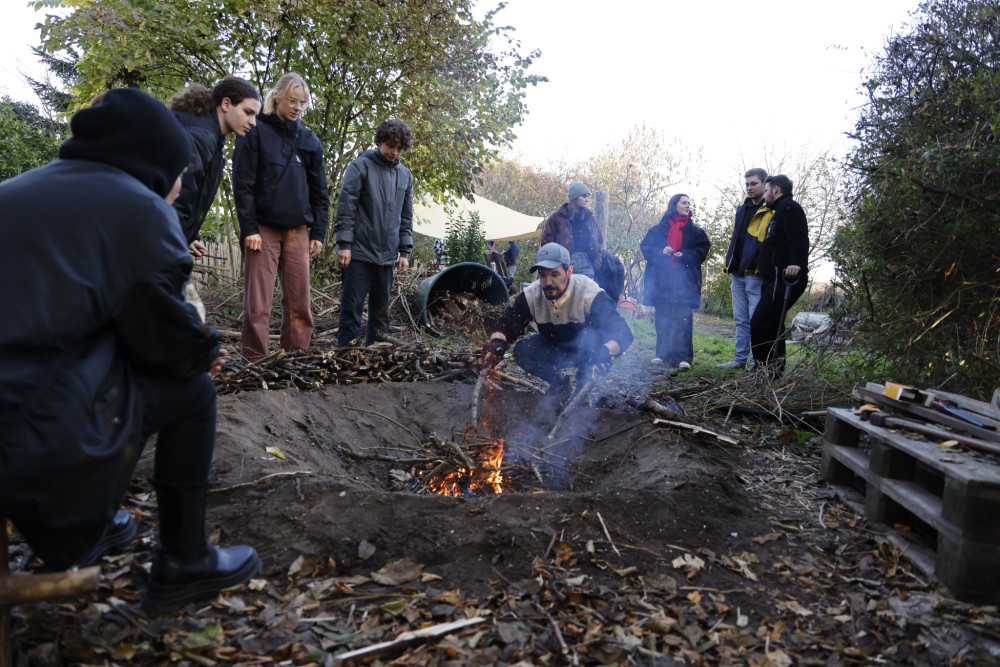
With Markus Bier and Vik Bayker/Michael Reindel (Compost Collective, Vienna), students learned about composting as both ecological practice and speculative method. Activities ranged from making biochar to building compost heaps, while also reflecting on cycles of transformation. Field visits included a local school garden and Karlsruhe’s community gardens.
Markus Bier likes the transformative power of fire. He is passionate about biomass, soil and the role of microorganisms in all digestion and transformation processes. Since 2012, Markus has been producing and utilising biochar from residual biomass in gardens, crops and food waste. After founding the German office of the international NGO Solidaridad Network in 2017, he is now responsible foar coffee as Corporate Partnerships Manager.
Michael Reindel and Vik Bayer are members of Compost Collective (Vienna). Within his sculptural practice Michael Reindel interlaces local and global circumstances of places, in order to correlate them with infrastructural processes, which form our present. Vik Bayer is an artist and filmmaker who mainly works on and with agriculture as a form of care-taking that entails the possibility of radically changing our hegemonic extractivist reality.
8 Oct 2024
Introducing the Living Library Education Programme
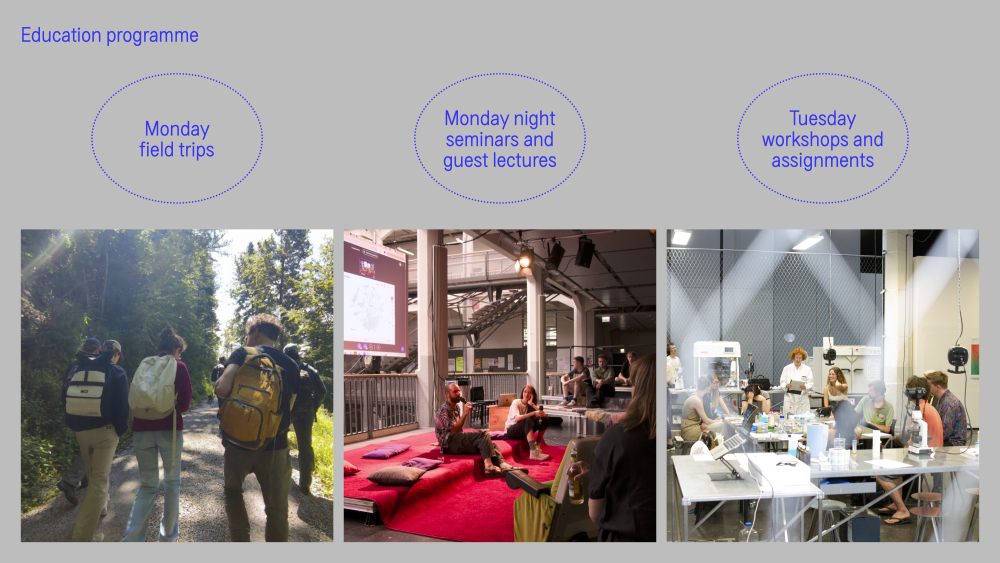
The education programme unfolded through a series of two-day events, each combining a field trip, a colloquium, and a hands-on workshop. These gatherings became spaces where knowledge from different domains intersected, linking materials to the locations and communities from which they emerged, while connecting students with practitioners who could guide both conceptual reflection and practical experimentation. By bringing together local and international voices, the programme cultivated a culture of equal exchange.
The first day centred on exploration. Participants visited local sources of sustainable materials, observed natural cycles, and engaged in early experiments such as fibre extraction, composite formation, or cultivating biomaterials. The colloquia then provided space to share insights from the excursions, situating them within broader discussions on biodesign and bioregioning, new materialism, or more-than-human narratives. Hosted at the HfG Karlsruhe and publicly streamed online, these sessions opened the exchange to a wider audience while weaving together perspectives from students, makers, and researchers.
The second day shifted the focus to making. Guided by invited practitioners, students processed and worked directly with the materials collected during the field trips. This phase emphasised knowledge and skill-building, showing how theoretical research and ecological reflection could be translated into practice. By engaging with materials through touch, experimentation, and iteration, students discovered both the potential and the limitations of local resources, insights they can carry on into their own independent practice.
8 Oct 2024
O-Days: Introduction to the Living Library
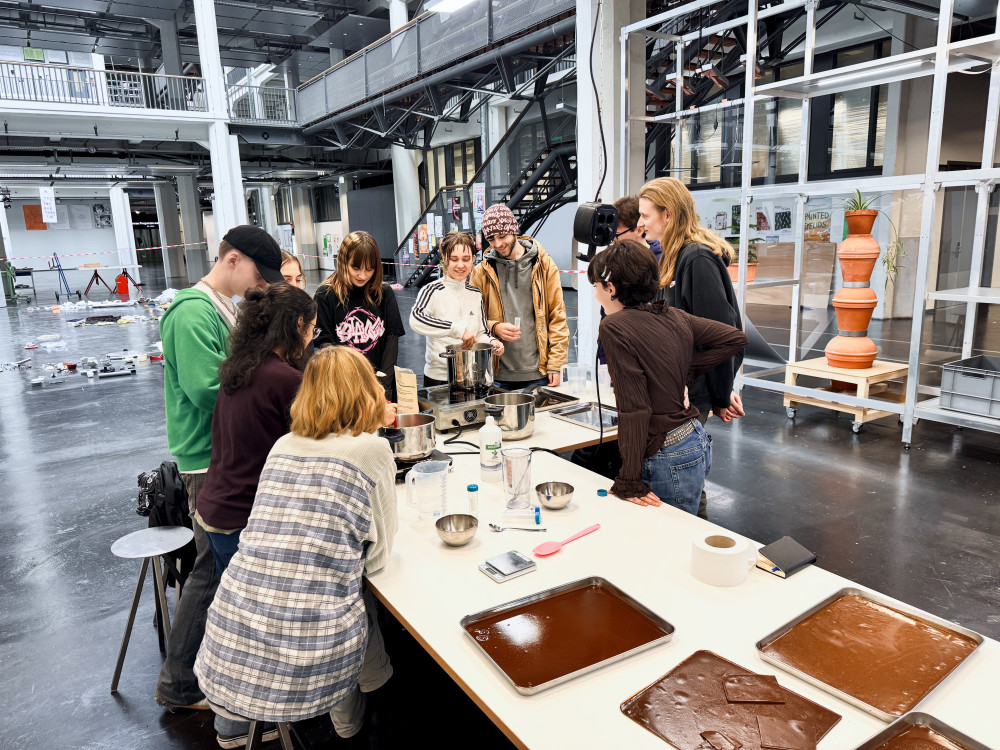
The team will start the workshop with a brief introduction about the Living Library project and how it relates to the Bio Design Lab, now located at the Ufo space, showing what tools they offer on their website and how students can use them to explore the local area. Furthermore, the team will introduce the Living Library's new space, its educational programme and how students can sign up for it.
The students will discover more in detail about the material library display and the shelf system, through a quick introduction of a compost prototype and highlighting a few materials’ properties, which can be worked on in the Bio Design Lab. The workshop, suitable for a maximum of 15 students, will end with a group activity learning in detail how to create a bioplastic material.
20 Sept 2024
Soft-Opening: Living Library / Common Grounds in Fellow Travellers
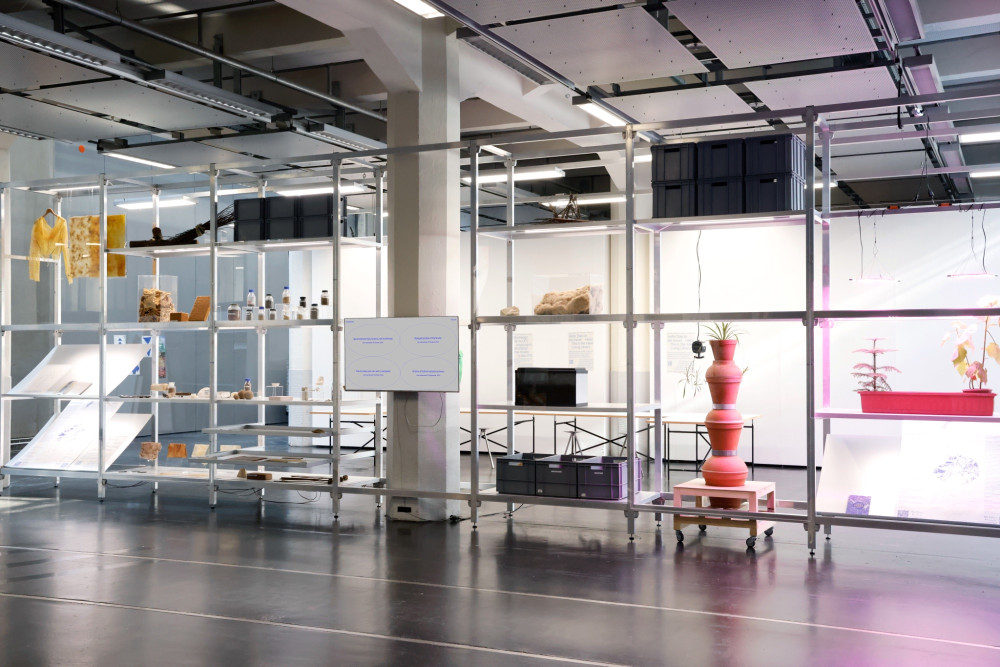
Celebrate the new space of the Bio Design Lab with us: Starting in the winter semester, the BDL will be available in the Glasrondell (ground floor, main entrance Lorenzstraße) with a wetlab for sterile work with bio-based and living materials and an open Drylab for contaminated experimentation!
Toast the opening of the Living Library with us! Until March 2026, the circular material library and the associated website will serve as an experimental zone, teaching location and permanent exhibition for local materials and production methods within a radius of 50km. The artifacts from regional excursions and workshops will be on display here from WS2024/25 and will be composted live.
Explore previous projects of the Bio Design Lab in the exhibition section Common Grounds in the ZKM show “Fellow Travelers”. The retrospective presents back-to-back with the ZKM Streuobstwiesenprojekt selected works around more-than-human design and permacircular artistic practices.
We would like to toast these joyful events with you – on September 20 at 6:30 pm on the ground floor of the HfG, Lichthof 4 (former location of the BDL).
There will be drinks and music – and afterwards we will go over to the ZKM for the opening of the Fellow Travellers exhibition at 7:30 pm.
18 Jun 2024
Living Futures #2
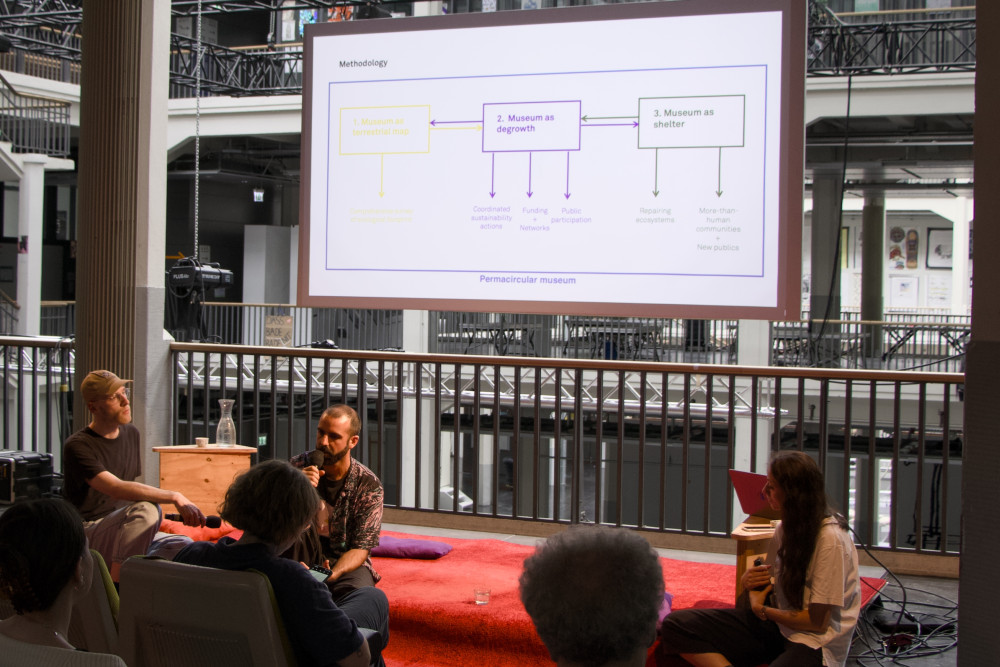
The Living Futures-Colloquium is a series format aimed at fostering interdisciplinary collaboration in the HfG Karlsruhe and exploration in the realms of bio art and design, new materialism, posthumanism, more-than-human narratives, sustainability, and life cycles.
This time we’ll talk about permacircular museums, compost-core practices and the aliveness of materials with guests Stéphane Verlet-Bottéro and Eva-Maria Lopez.
3 May 2024
Living Futures #1
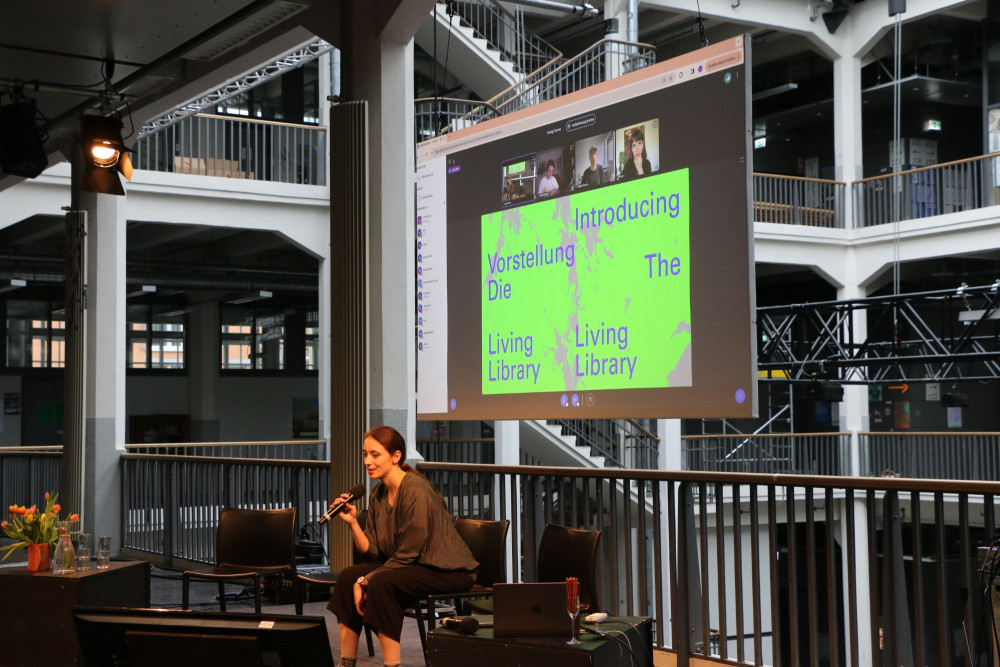
A Colloquium on Experimental Ecologies, Posthuman Narratives and Beyond.
The Living Futures–Colloquium is a series format aimed at fostering interdisciplinary collaboration in the HfG and exploration in the realms of bio art and design, new materialism, posthumanism, more-thanhuman narratives, sustainability, and life cycles. This series brings together experts and practitioners from diverse fields such as art history, product design, communication design, media art, and photography to delve into the intersections of their disciplines with cutting-edge concepts in contemporary art and design.
2 May 2024
Stoffe wechseln: Zur Geschichte des ‘nachhaltigen Materials’ with Franziska Müller-Reissmann
Franziska Müller-Reissmann, trained restorer and long-time head of the materials archive at the ZHDK, will provide insights into her dissertation research and uncover many myths and stories about (sustainable) materials.
Please note – due to lecture overlaps, the talk will take place at 17:30 on the Lichtbrücke/Reeling. If you are still hungry for input afterwards, you can continue directly to the HfG/ZKM talk series with Boris Buden at the ZKM.